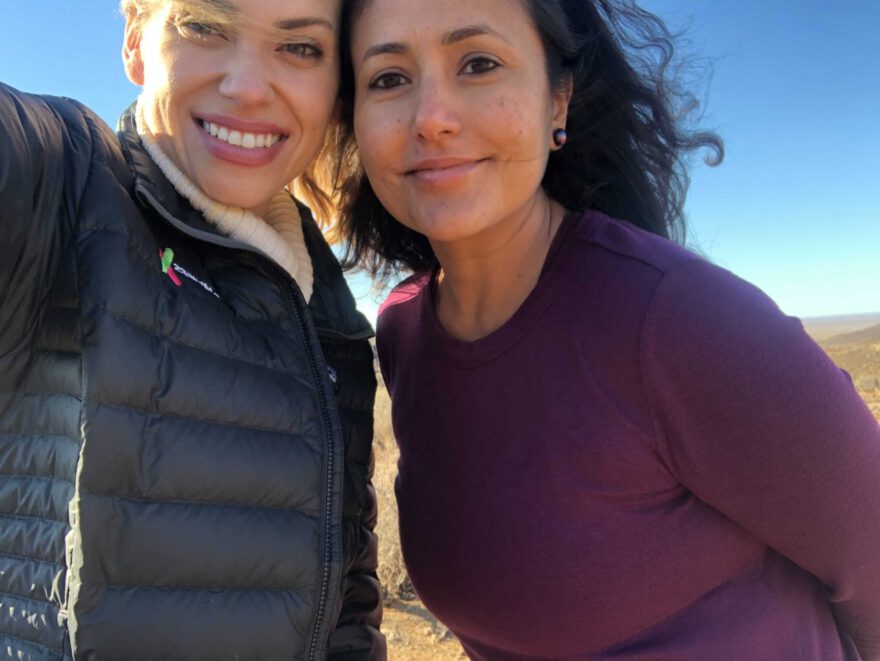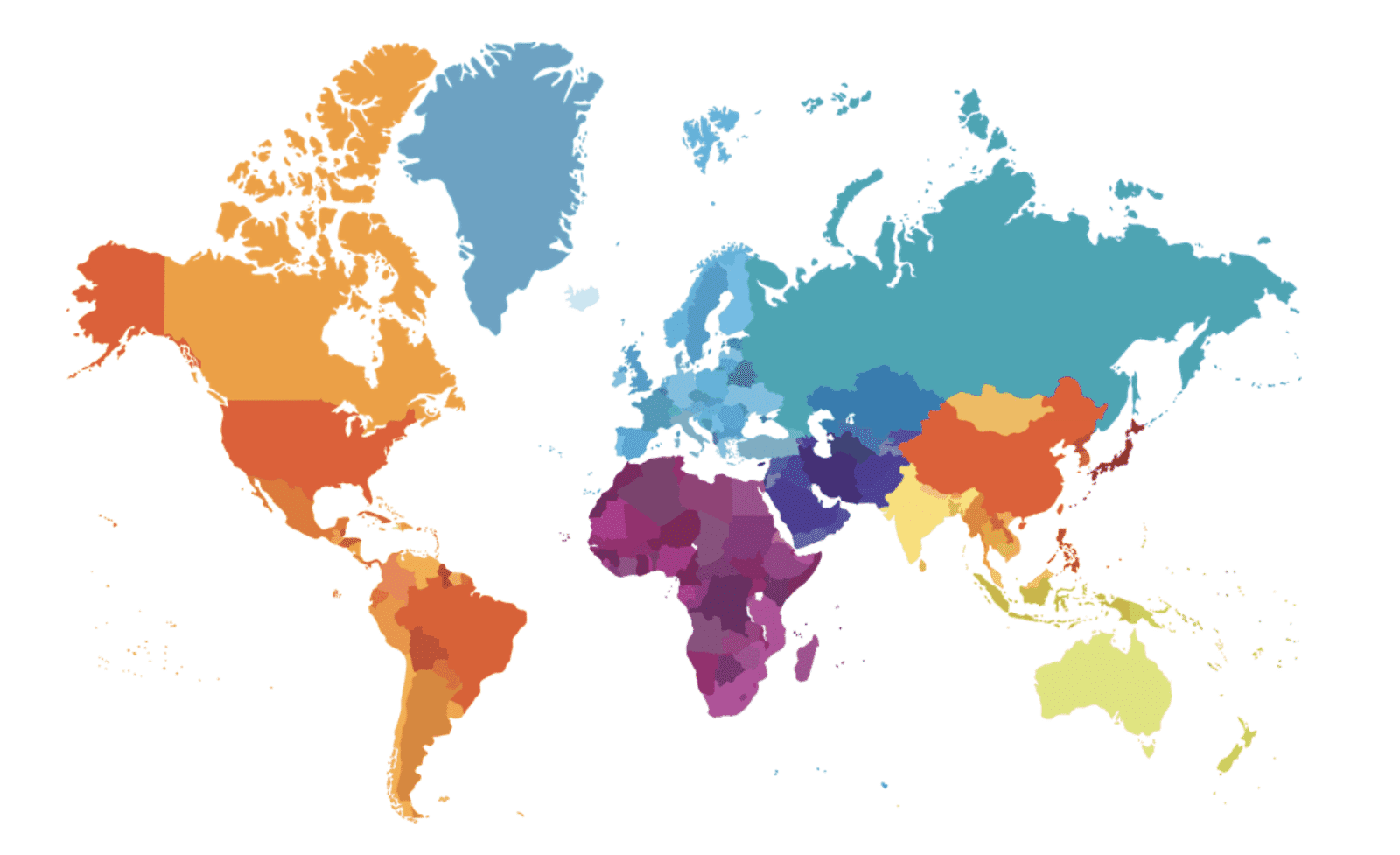If you are familiar with 23andMe, you know that a lot of science goes into what we do. But there have always been considerations about how to do our work ethically and responsibly.
Populations Collaborations
A good example is our recent work addressing disparities in genetics research for underserved populations internationally. As part of that work, we collaborate with scientists working among underserved communities in Africa, the Americas, and parts of Asia through our Populations Collaborations Program.
To ensure that this research is conducted ethically, 23andMe’s Research Team developed a framework specific to working in these communities.
The framework outlines key ethical principles and best practices for conducting research that meet the ethical challenges of engaging with populations historically underrepresented in genomics research. In the process, our team developed what could be a model for other researchers working in these communities.

Emily, left, and Anjali, on a recent trip doing local community engagement work for one of 23andMe’s Population Collaboration Projects.
Research Ethics at 23andMe
The Research Ethics team at 23andMe develops the protocols and policies for conducting all the research projects 23andMe undertakes. All of that research is overseen by an outside, third-party Institutional Review Board (IRB).
The IRB is involved early in any research project, looking at the proposed scope of the study, how we conduct that research, and how we communicate with participants. The IRB’s job is to ensure that our work complies with federal regulations. In turn, the 23andMe Research Ethics Team liaises between the IRB and our scientists.
The Common Rule
23andMe also applies The Common Rule (The Federal Policy for the Protection of Human Subjects (also known as the Common Rule or 45 CFR part 46) to all of its research. The Common Rule promotes the ethical conduct of research and the protection of people participating in research).
It was built upon the ethical principles in the Belmont Report, which describes guidelines for treating people right in research. Those guidelines, first developed in the early 1970s, grew out of the revelations that detailed the egregious treatment of biomedical research people. Among the more infamous in this country is the Tuskegee syphilis study. From the Belmont Report come the basic principles around respecting research participants, ensuring that participants are not harmed and are treated fairly.
Representation
However, when conducting research with underrepresented international populations, additional ethical considerations require tailored approaches and commitments that expand beyond the federal regulations for conducting ethical research. To this end, we identified a need to develop an ethical framework that extends beyond the requirements of the Common Rule. We wanted to provide guidelines and best practices for the conduct of ethical industry-academia collaborative research with understudied populations.
Coordinating all that work is a tall order, but after more than 15 years, we have it down to a science. It helps that 23andMe baked ethical considerations into what we do from the beginning. It also helps that we have regulatory rules to help guide that work.
Emily and Anjali, members of the 23andMe Research Team, are responsible for this. The team includes a core group of experts who ensure that the interests of our research participants and customers are considered and protected.
International Ethics Framework
In February, 23andMe Regulatory Scientist Emily Bullis, MA, and Senior Program Manager Anjali Shastri, Ph.D., presented an ethical framework developed for Industry and academic partnerships in genetics research as part of a seminar series put together by the Center for ELSI Resources and Analysis, which is based at Columbia University. ELSI is the acronym used for the Human Genome Project’s Ethical, Legal, and Social Implications of mapping the human genome.
Founded in 1990, the program helps to identify and address issues that could arise from genetic research that impact people, families, and communities. 23andMe has engaged with the ELSI community since our founding. The framework guides our work on the Populations Collaborations Program, which has involved research collaborations in Angola, Madagascar, Honduras, and the Democratic Republic of the Congo, among other locales.
The framework was developed for 23andMe’s purposes, but Emily and Anjali actively seek feedback. They’ve contacted scientists, bioethicists, non-academics, and the communities impacted by our international research. Ultimately, they hope the framework will inform other genetic research in underrepresented populations. In turn, it could help expand that research’s impact and benefit.
It Starts with Stakeholders
Emily and Anjali built the framework by identifying the key stakeholders who should have a say in conducting the research. The stakeholders they identified include the local community being studied, the research participants, and the local scientists and regulatory bodies and their institutions.
They also shared some of the core principles of the framework we developed:
- The first pillar of the framework is a commitment to: build and maintain long-term relationships with each of these groups, before, during, and after the research takes place
- The second pillar is to, through these interactions, derive local, historical, social, political, and economic context
- The third pillar is a commitment to developing all aspects and plans for the research in collaboration with key stakeholders so they have a say in how the research is conducted and how their data are used. The hope is that these groups inform all aspects of the research. For example:
-
- They help develop educational materials to explain the research and the informed consent.
- They communicate potential risks to the individual and community being studied and help develop the plans to minimize these
- They help develop plans for the research data and samples to be sure that they collected, used, and stored according to community preferences
- They help identify opportunities to maximize benefits to be shared with the local community, including supporting local scientists
- They help identify the best way to give the research results back to the participants.
These simple principles have not always been followed by western researchers working among underrepresented populations. Language and cultural barriers, the lack of access to technology or education, can further compound the problem.
In working with our collaborators, 23andMe ensured that our researchers engaged with local academic institutions and communities before, during, and after their work. We and our collaborators worked with local groups to ensure that community members fully understood the risks and benefits of participating in research. For some of our collaboration projects, 23andMe has created scholarships for local community members, given out community benefit grants, and assisted local scientific institutions.
Behind Every Data Point
Ethics, rules, and regulations are important, but probably what is most important at 23andMe is our culture.
At the core of 23andMe is the idea that behind every data point is a human being. And that research participants are not subjects, but people who belong to communities and populations and deserve to have a voice in research.
That culture is what overlays all the work we do. As our research has expanded to include collaborations with scientists working with remote and underrepresented populations around the world, new issues can pop up. But it’s our culture, built on a respect for people, and approaches developed by our Research Team, that helps guide us. Maintaining that integrity promotes trust and support for the research we do that can also benefit people living in those understudied communities.




